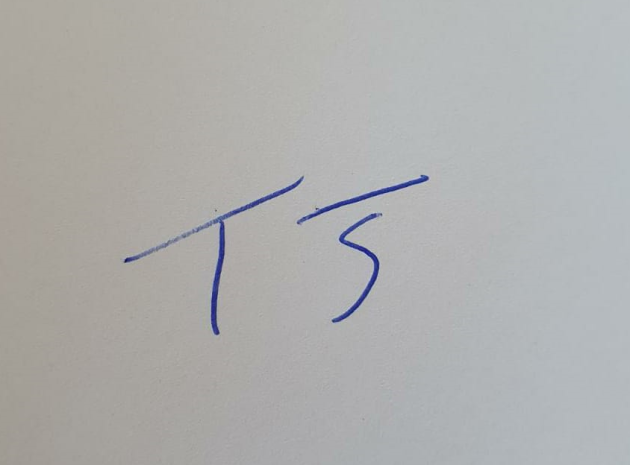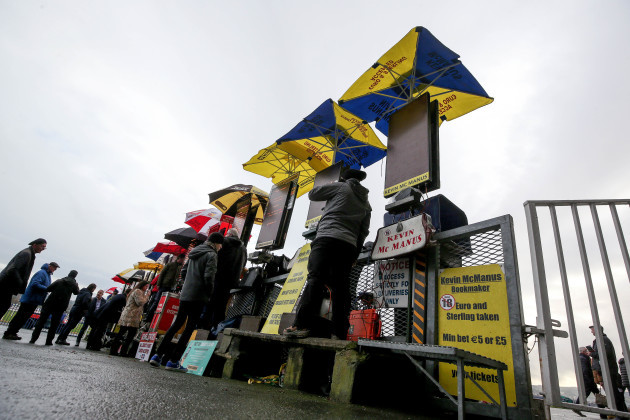I SPENT A portion of my late teens working in a betting shop in Finglas, eye-opening.
Nearly all punters lost, some more imaginative in their attempts to win.
A young lad from a rough background would punt greyhounds, his writing so vague as to render it impossible to prove whether he were attempting to back trap three or five, see below:
Others would hand over the slip moments before the off and suddenly struggle to find the cash if the dog’s fate were sealed at the first bend — a matter of seconds. Skullduggery was common.
A mate whose mum worked in Belfast recalls how the paramilitaries used to bet the dogs, write “£50″ on the docket but claim it was “only meant to be a fiver” if the canine beast did not prevail.
Whilst I write this, I note the polling on Twitter to my question: If you were in a betting shop and were overpaid on a bet would you (a) report it to the cashier or (b) take your cash and leave?
One respondent’s suggestion that the 23pc who voted (a) “were liars”; he has gotten plenty of likes.
I say this to paint a picture of punters that can at least challenge the lopsided view of bookmakers many have: that they are vultures, heathen capitalists who drive people to poverty or even suicide.
Doubtless bookmakers have engaged in morally-corrupt pursuits but if punters are to achieve some form of parity we need to escape the blinkered view that it is a battle between good and evil.
Bookmakers may not be likeable but punters are very often worse.
The issue of restrictions came to the fore again, which is a good thing, after Jason The Militant’s 25/1 win at Naas last Sunday. Owner Peter Michael refused to accept his prize from sponsor Paddy Power as a means of protest against bookmaking behaviour.
Nobody has an issue with bookmaking restricting customers obviously. High on the list of those whose accounts tend to be purged are people working for other bookmakers, which further illustrates the moral quagmire. The issue, or at least mine, is how bad it has become.
For example, a friend of a friend recently backed a market mover in a horse race and his account was restricted, even if he has lost consistently since he opened his account and stakes low. With some firms, it has gotten to utterly ridiculous levels.
If I were to read this article elsewhere and purportedly written by someone else this morning I would be livid, yet this is now rampant in bookmaking: firms copying the odds compiling of others because they will not pay their own odds compilers to do the job.
At Southwell racing midweek, there were three bookmakings whose job is little more than returning the SP. We are racing dangerously towards the abyss of no opinions left in racing outside of the betting exchange, where everyone is faceless.
I hereby call on one of the high-street firms to stand up for horseracing and commit to laying to lose €1,000, win only, no guaranteed odds, on any race in Ireland or Britain. This would do wonders to revive the admirable art of pricing up a race, encourage people to bet more responsibly and, in my view, make the game more attractive to prospective bettors.
If you are laying a guy who is good, use him to help mark your card. Winners can be welcome: it is all about ensuring increased turnover and getting everyone in racing to bet with you over the rest. Remember that only two or three per cent of punters win.
Take Australia, for example. In New South Wales, Metropolitan tracks have a minimum lay-to-lose of $2,000 on a win bet, $800 on a place bet; with the pro/country tracks $1000 and $400 respectively.
Note that in Australia the rules vary per state and that the bookmakers price more conservatively depending on how many hours until each race. No punter should have an issue with that: where are all the brave layers on Betfair overnight?
Punters need to realise that bookmakers who price up races are dealing every day with horses that could go off 2/1 or 20/1; that is pretty much unheard of in field sports. They have to deal with horses being stopped, stewarding being inadequate and the danger of multiple coups like those of Barney Curley or Charles Byrnes that can cost colossal sums of money.
Noel Hayes, who has extensive experience in the industry, is like many who remain therein: he believes minimum-lay-to-lose is fraught with risk – potentially for punters.
“I don’t think minimum lay to lose would be an overall good thing for the punters. The first rule of economics is there’s no such thing as a free lunch. It has to come from somewhere so implied margins increase, best odds guaranteed, special offers and so on are all going to move away.
“It’s happening already: bonuses on lucky bets are all but gone since punters got smart and learned how to abuse them and firms started to realise how much they were costing them.”
And it is the abuse to which Hayes refers which anecdotally is making Betfair reconsider its offer to lay every account a liability of £500 after 10pm on each Irish and English race since 2018. Paddy Power is offering the same but not on every class of race.
Laying to lose £500 to everyone hardly seems especially revolutionary: we are talking about your mate looking to have a score on a 25/1 shot. But what the traders have found is that the offer is losing money because they are laying robots who are using multiple accounts to deal in arbitrage, essentially trading in conjunction with the Betfair exchange market.
By all accounts, Betfair’s racing team may consider getting rid of the offer because it hasn’t gotten the good will of punters it expected, while at the other end dealing with arbers, who are essentially no good to anyone but themselves. They offer nothing in terms of opinion or form judgment.
“Bookmakers aren’t bookmakers,” Hayes adds. “They are purveyors of entertainment — that’s capitalism.”
The capitalist world is servile to the pursuit of profit at people’s expense, utilising as few human beings as possible, and bookmakers essentially could easily survive without racing. They will just cream off punters laying in-running on sports, a race in which they basically cannot lose. For the financial year ended March 31, 2019, in-play accounted for a staggering 79 per cent of betting revenue with the behemoth, Bet365.
As one industry insider said, “you can already imagine the dystopian shops of the future. No staff – only betting terminals.”
These already exist. Will a minimum lay to lose offer exist in Ireland? Ireland’s proposed gambling regulator, if he or she ever progresses from the stage of an ideal, will need to consult punters and work on making betting on racing a fairer pursuit. Whether it entails laying in shops only, over the phone, or with a bet acceptance delay in built, I firmly believe a minimum lay to lose can work as well here as it does in Australia.
Nothing solves life’s problems like a Twitter poll. As I type, my poll is nearing 2,500 votes, with over 30,000 impressions. Many have engaged, from some saying they cannot believe the dishonesty of punters to others wondering why there was even a debate.
“One of my pals was (overpaid €800) one day,” wrote one. “Did honest thing, went back and handed it in. Next time he tried to get on in (the) same shop he was restricted to (SP) only.”
Another industry insider, in that paradoxical parish of being both a punter and working for a bookmaker, added: “Any argument on this issue needs to associate the account restrictions in with the overlaying of degenerate gamblers”.
“It is exactly the same functionality: they will lay their smart customers 10pc of their max bet but lay profitable customers up to 1000pc of theirs.”
The relationship between the backer and the layer need not be so septic but it is it is hard to see how any progress can be made. In the meantime, we are in a race to the bottom where bookmakers no longer offer any opinion on racing, which was part of the fun. We need bookmakers ignoring the exchanges and standing horses to lose money, pontificating about why they are on social media and getting people talking about something that isn’t the English appropriation of craic.
If, indeed, they are even bookmakers any more.
This evening at Dundalk, bookmakers, the vast majority of them copying someone else, have chalked up Shorter Skirt at 25/1 in the Love Your Mum At The Races 20th & 21st March Handicap (7.30). She may not win but it seems a disservice to the talents of her new trainer, Jack Davison, to put her in so big.
And on Sunday, I really like the chance of Favori Logique in the TRM Equine Nutrition Handicap Hurdle (3.55), a horse to keep on side over the coming months for Ross O’Sullivan.
Shorter Skirt is part-owned by Robert Hall. One time I wrote a couple of gambling diaries in the Racing Post, entailing plenty of jargon, like “bag of sand” (grand), “monkey” (€500) and so on.
Robert rang me, not so much to praise the article, but ask: “Johnny, what’s a bag?”
Be nice to be able to win a bag again in a betting shop.


